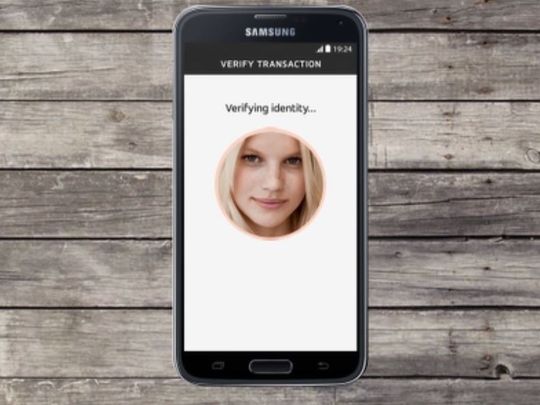MasterCard tries out ‘selfie pay’ for online purchases
For the selfie generation, it might be the perfect way to pay.
MasterCard is trying out a new technology that lets online shoppers authorize a transaction with a snapshot of their face instead of a password.
“As the world gets increasingly digital, this will be the next wave of technology that will change the consumer experience of shopping digitally," says Ajay Bhalla, president of enterprise security solutions for MasterCard. “It’s all part of our role in making commerce available anywhere, any time, on any digital device."
More than 200 employees of First Tech Federal Credit Union in the U.S. are taking part in a two-month pilot, through October, in which they verify who they are with either the scan of a fingerprint or a smartphone selfie. A similar trial is taking place in the Netherlands.
This latest innovation comes at a time of dramatic change in the electronic payments sector. Apple Pay lets consumers sign off on a purchase, paid for with a stored credit card, with a fingerprint. And the U.S. is catching up with Europe and other parts of the world by switching users to chip-embedded credit and debit cards, considered more secure than those with just a magnetic stripe. On Oct. 1, that shift hit a milestone with retailers becoming liable for fraudulent transactions made with a chip card that they are not equipped to process.
To use MasterCard’s selfie payment option, a customer would need to download its Identity Check app. Then, if they are buying a product from a merchant that requires their identity to be verified before purchase, they will get a push notification to their mobile device, which opens the app. They then hold up their phone, like taking a selfie, blink, "and you’re done," Bhalla says. “It’s ... a seamless, smooth experience."

The blink prevents a criminal from just holding up another person's picture, Bhalla explained. A facial recognition scan converts your features into a string of ones and zeros, and that, not your actual picture, is processed. The security boost MasterCard anticipates from the use of facial verification is necessary, he says. According to Aite, a consulting firm, 45% of payment card losses are from online transactions.
Another perk? Authorizing a purchase with a photo cuts out the need for remembering yet another password.
“Within most parts of the world, when you do a digital transaction, you use a password, and that’s a big problem because people can’t remember them," Bhalla says. “That means they’ll struggle when completing the transaction." A global survey of about 10,000 consumers, commissioned by MasterCard and conducted in August, found that one-third of of consumers have bailed on an online purchase because they couldn’t recall their password.
If the pilot programs are deemed successful, MasterCard plans to introduce the face and fingerprint technology to more banks, with the ultimate goal that “it eventually will be rolled out to everybody," Bhalla says.
Such innovations are probably going to become more common, and should go a long way toward better safeguarding consumers’ financial information, says Matt Schulz, senior industry analyst for CreditCards.com.
“Biometrics are likely the future of credit card security," Schulz says. “They're a major step in the right direction, because when your face is your password, you can't forget it, and it's much harder to steal than a PIN."
Selfie pay should prove particularly popular with Millennials, according to James DeBello, CEO and president of Mitek, a mobile imaging technology company.“They love the convenience of taking a picture for data capture and they want to be doing more of it,'' he said in an email.
A Mitek poll of 1,004 Millennials found that 86% make purchases and perform other transactions via their smartphones. “When you also look at the fact that 28% want to enroll for everything from a new credit card to a gym membership by taking a picture of their driver’s license, you start to see the appetite for adding the snap of the camera to mobile transactions.''
MasterCard isn't the only credit card company working on new ways to check out. Visa has developed a technical blueprint that can eventually be used industrywide to enable the use of fingerprints, a face, palm and other biometrics, as verification of a person's identity during on-site transactions. And, along with the facial recognition and fingerprint trials currently underway, MasterCard is also looking at the possibility of voice recognition or even a person’s heartbeat being able to confirm who they are.
Read entire article at USA TODAY
Source: MasterCard
Graphic: Janet Loehrke, USA TODAY
Article by Charisse Jones, USA Today
MEDIA CONTACT:
KATY LASEE | MARKETING DEPT.
651 554 8533
KRLasee@traveltags.com
TAGS:




